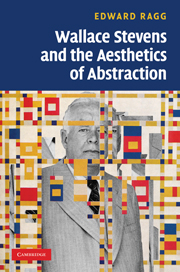Book contents
- Frontmatter
- Contents
- Acknowledgements
- List of Abbreviations
- Introduction: ‘Stevensian’ and the question of abstraction 1935–2009
- 1 The abstract impulse: from anecdote to ‘new romantic’ in Harmonium (1923) and Ideas of Order (1935)
- 2 The turn to abstraction: Owl's Clover (1936) and the ‘un-locatable’ speaker in The Man with the Blue Guitar (1937)
- 3 The ‘in-visible’ abstract: Stevens' idealism from Coleridge to Merleau-Ponty
- 4 Abstract figures: the curious case of the idealist ‘I’
- 5 Abstract appetites: food, wine and the idealist ‘I’
- 6 The pure good of theory: a new abstract emphasis
- 7 Bourgeois abstraction: poetry, painting and the idea of mastery in late Stevens
- Bibliography
- Index
6 - The pure good of theory: a new abstract emphasis
Published online by Cambridge University Press: 04 August 2010
- Frontmatter
- Contents
- Acknowledgements
- List of Abbreviations
- Introduction: ‘Stevensian’ and the question of abstraction 1935–2009
- 1 The abstract impulse: from anecdote to ‘new romantic’ in Harmonium (1923) and Ideas of Order (1935)
- 2 The turn to abstraction: Owl's Clover (1936) and the ‘un-locatable’ speaker in The Man with the Blue Guitar (1937)
- 3 The ‘in-visible’ abstract: Stevens' idealism from Coleridge to Merleau-Ponty
- 4 Abstract figures: the curious case of the idealist ‘I’
- 5 Abstract appetites: food, wine and the idealist ‘I’
- 6 The pure good of theory: a new abstract emphasis
- 7 Bourgeois abstraction: poetry, painting and the idea of mastery in late Stevens
- Bibliography
- Index
Summary
‘MAJOR MAN’ REVISED: ‘PAISANT CHRONICLE’ (1945) AND ‘DESCRIPTION WITHOUT PLACE’ (1945)
Here we are all in the fever of contemporary life, with everything fundamental turned upside down and in course of re-examination. That alone and without reference to the profound misery in Europe, should exact from the right people the best they have.
The year 1945 was pivotal in Stevens' poetic development. Following Parts of a World and ‘Notes Toward a Supreme Fiction’ the poet experienced a re-examination of his own. Those texts had featured an icy world replete with heroic figures and other nominally ‘cold’, crystalline entities. Stevens' embrace of abstraction engaged a new vocabulary characterized by poetic symbols, the nomenclature of his early 1940s aesthetic. Largely advertised by ‘Notes’, ‘major man’, ‘the first idea’, a ‘supreme fiction’, the ‘death of the gods’, the ‘fluent mundo’, even ‘the abstract’ itself became the terms of a specialist idiom. The impulse toward such rhetoric emanated from Ideas of Order, as Stevens desired to overhaul ‘pure poetry’ in a modern age. But the highpoint for creating an abstract language built into the fabric of an increasingly abstract poetic was 1942, and although Stevens continued to write abstractly he would have less use for an explicit vocabulary, as the mature poetry of his final decade indicates.
Stevens carefully jettisons his 1942 idiom in poems written during 1943–45. Whilst the later poetry refers to such terms as ‘reality’ and ‘imagination’, the need for stylized abstract figures occupied Stevens less.
- Type
- Chapter
- Information
- Wallace Stevens and the Aesthetics of Abstraction , pp. 166 - 203Publisher: Cambridge University PressPrint publication year: 2010



